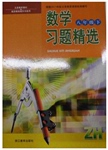题目内容
-_________ I leave here at once?
-No, I don’t think you _________.
[ ]
A.
Must; have to
B.
Must; ought to
C.
Can; must
D.
May; dare
答案:A
解析:
解析:
|
must表示主观的看法。have to表示客观的必要,意思为“不得不”。本题中的I don’t think you have to表示“我认为你不必离开”。 |

练习册系列答案
 习题精选系列答案
习题精选系列答案
相关题目